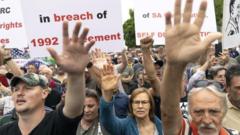The court ruled that the concept of a 'white genocide' in South Africa is a manufactured notion, dismissing a wealthy benefactor's attempt to fund a white supremacist group. This decision comes amidst international attention and outcry about the treatment of the country’s white minority.
South African Court Rejects 'White Genocide' Claims as Fabricated

South African Court Rejects 'White Genocide' Claims as Fabricated
A recent ruling by a South African court has dismissed claims of a 'white genocide' in the country, aligning with mounting evidence against such narratives.
In a landmark ruling, a South African court has categorically dismissed claims of a so-called 'white genocide' occurring in the nation, branding these assertions as "clearly imagined" and "not real." This decision is especially relevant as the discourse surrounding this notion has gained traction, notably picked up by figures such as former US President Donald Trump and tech entrepreneur Elon Musk.
The case was initiated concerning a wealthy benefactor's (Grantland Michael Bray) bequest of $2.1 million (about £1.7 million) to the controversial white supremacist group known as Boerelegioen. The court highlighted that Bray's request was both invalid and vague, stressing that it clashed with established public policy.
The narrative of a 'white genocide' has been championed by Trump, who claimed there was a widespread killing of farmers in South Africa, and Musk, who previously criticized what he termed "racist ownership laws." Both have expressed sympathy for white South African farmers, suggesting they seek refuge in the US due to alleged persecution. Musk, in particular, has a personal connection to South Africa, having been born there and residing until he moved to the United States.
The ruling emerged following objections from Bray’s siblings, who, as trustees, asserted their brother had become fixation with the so-called genocide of white people in South Africa during the last decade of his life. Judge Rosheni Allie pointed out that Bray's irrational beliefs were influenced by paranoia and extensive exposure to extremist content online.
Bray had previously engaged with members of Boerelegioen in 2020 and directed significant resources towards their operations. This organization identifies as a "civil defense movement," claiming to protect white citizens from alleged threats. However, in her ruling, Judge Allie noted that Bray's intentions behind the donations were rooted in unsupported fears of genocide against whites—a notion that she firmly declared was without merit.
Moreover, the judge emphasized that the group did not represent a legitimate beneficiary due to the ambiguity surrounding its identity and mission. The court ordered Boerelegioen to bear the costs of the legal proceedings, underscoring the court's disapproval of utilizing funds for promoting racial animosity.
This ruling comes at a pivotal moment, as Trump has recently imposed a freeze on financial aid to South Africa, in response to a controversial law permitting government-sanctioned land seizures. Despite the heightened tension and rhetoric surrounding the plight of South African farmers, statistical data reveals that violent crime in the country does not correlate with these claims. Between October and December 2024, a mere 12 murder incidents were recorded as farm attacks, compared to higher totals of women and children victims in the same timeframe.
This latest court decision seeks to dismantle harmful and unfounded narratives that can fuel division and conflict, emphasizing the importance of evidence over speculation in the discourse surrounding race and violence in South Africa.





















